Governance in Globalizing World
VerifiedAdded on 2023/06/11
|9
|2171
|175
AI Summary
This article discusses the Volkswagen emission scandal and the role of higher authority in it. It also talks about the importance of CSR organisations and superannuation funds in corporate governance. The article uses various ethical approaches to analyse the scandal.
Contribute Materials
Your contribution can guide someone’s learning journey. Share your
documents today.
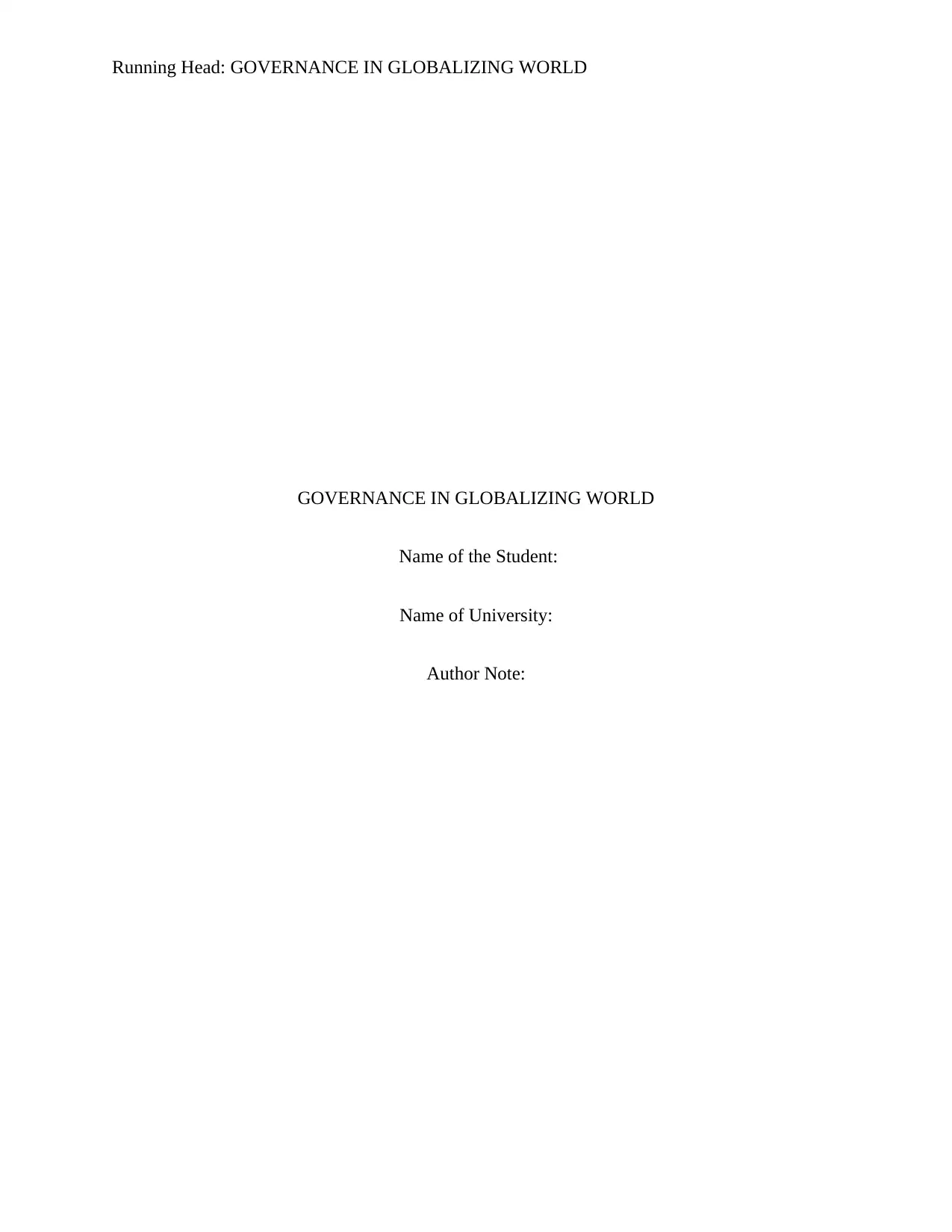
Running Head: GOVERNANCE IN GLOBALIZING WORLD
GOVERNANCE IN GLOBALIZING WORLD
Name of the Student:
Name of University:
Author Note:
GOVERNANCE IN GLOBALIZING WORLD
Name of the Student:
Name of University:
Author Note:
Secure Best Marks with AI Grader
Need help grading? Try our AI Grader for instant feedback on your assignments.
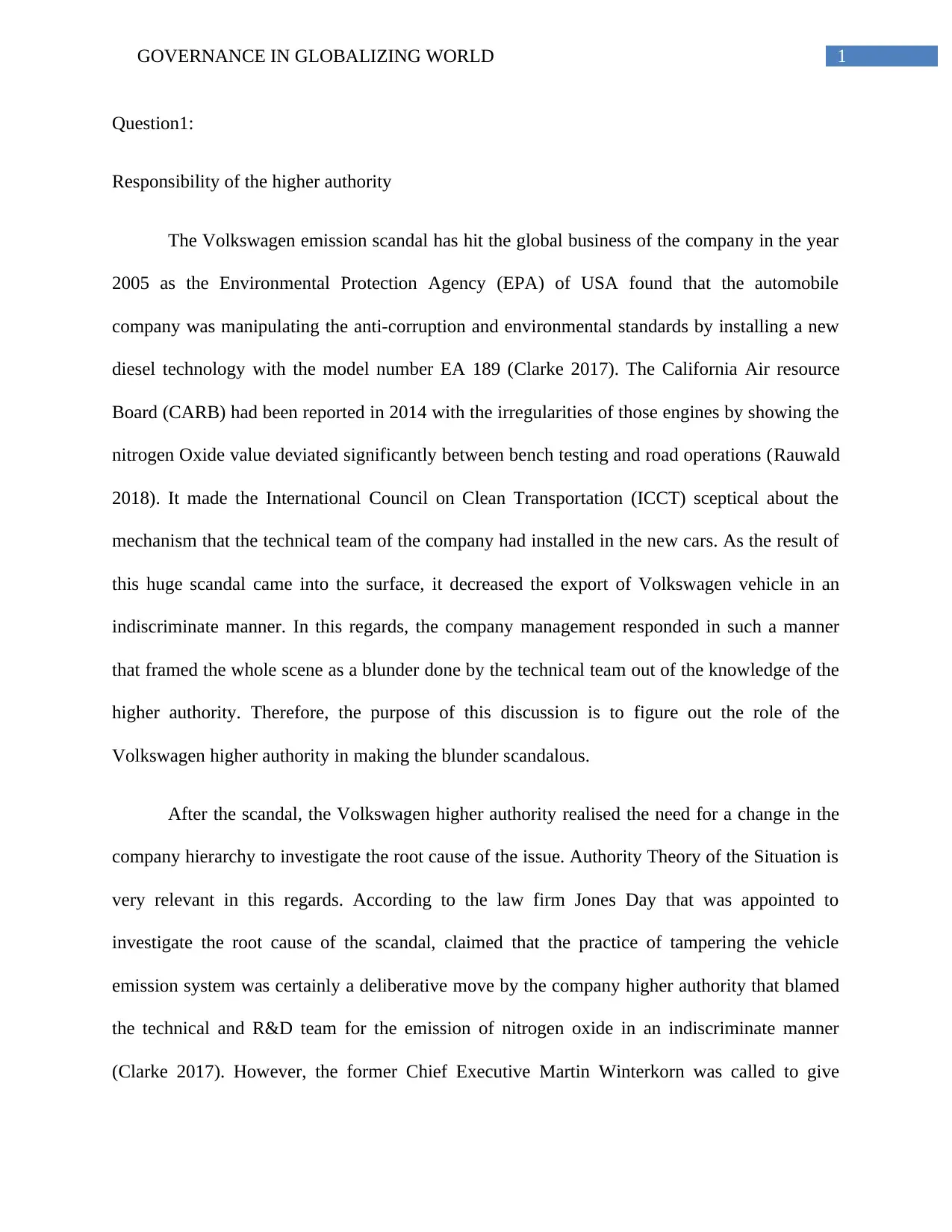
1GOVERNANCE IN GLOBALIZING WORLD
Question1:
Responsibility of the higher authority
The Volkswagen emission scandal has hit the global business of the company in the year
2005 as the Environmental Protection Agency (EPA) of USA found that the automobile
company was manipulating the anti-corruption and environmental standards by installing a new
diesel technology with the model number EA 189 (Clarke 2017). The California Air resource
Board (CARB) had been reported in 2014 with the irregularities of those engines by showing the
nitrogen Oxide value deviated significantly between bench testing and road operations (Rauwald
2018). It made the International Council on Clean Transportation (ICCT) sceptical about the
mechanism that the technical team of the company had installed in the new cars. As the result of
this huge scandal came into the surface, it decreased the export of Volkswagen vehicle in an
indiscriminate manner. In this regards, the company management responded in such a manner
that framed the whole scene as a blunder done by the technical team out of the knowledge of the
higher authority. Therefore, the purpose of this discussion is to figure out the role of the
Volkswagen higher authority in making the blunder scandalous.
After the scandal, the Volkswagen higher authority realised the need for a change in the
company hierarchy to investigate the root cause of the issue. Authority Theory of the Situation is
very relevant in this regards. According to the law firm Jones Day that was appointed to
investigate the root cause of the scandal, claimed that the practice of tampering the vehicle
emission system was certainly a deliberative move by the company higher authority that blamed
the technical and R&D team for the emission of nitrogen oxide in an indiscriminate manner
(Clarke 2017). However, the former Chief Executive Martin Winterkorn was called to give
Question1:
Responsibility of the higher authority
The Volkswagen emission scandal has hit the global business of the company in the year
2005 as the Environmental Protection Agency (EPA) of USA found that the automobile
company was manipulating the anti-corruption and environmental standards by installing a new
diesel technology with the model number EA 189 (Clarke 2017). The California Air resource
Board (CARB) had been reported in 2014 with the irregularities of those engines by showing the
nitrogen Oxide value deviated significantly between bench testing and road operations (Rauwald
2018). It made the International Council on Clean Transportation (ICCT) sceptical about the
mechanism that the technical team of the company had installed in the new cars. As the result of
this huge scandal came into the surface, it decreased the export of Volkswagen vehicle in an
indiscriminate manner. In this regards, the company management responded in such a manner
that framed the whole scene as a blunder done by the technical team out of the knowledge of the
higher authority. Therefore, the purpose of this discussion is to figure out the role of the
Volkswagen higher authority in making the blunder scandalous.
After the scandal, the Volkswagen higher authority realised the need for a change in the
company hierarchy to investigate the root cause of the issue. Authority Theory of the Situation is
very relevant in this regards. According to the law firm Jones Day that was appointed to
investigate the root cause of the scandal, claimed that the practice of tampering the vehicle
emission system was certainly a deliberative move by the company higher authority that blamed
the technical and R&D team for the emission of nitrogen oxide in an indiscriminate manner
(Clarke 2017). However, the former Chief Executive Martin Winterkorn was called to give
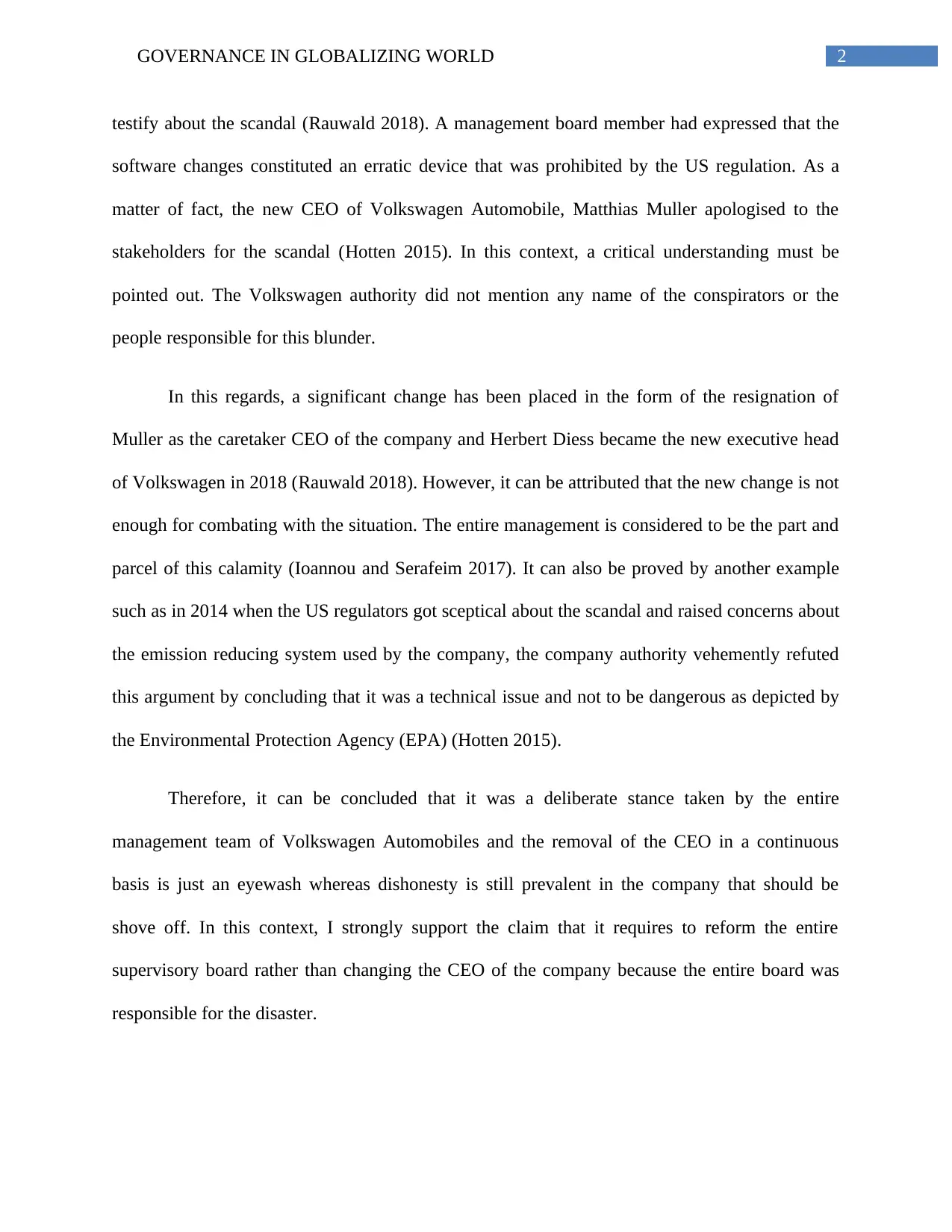
2GOVERNANCE IN GLOBALIZING WORLD
testify about the scandal (Rauwald 2018). A management board member had expressed that the
software changes constituted an erratic device that was prohibited by the US regulation. As a
matter of fact, the new CEO of Volkswagen Automobile, Matthias Muller apologised to the
stakeholders for the scandal (Hotten 2015). In this context, a critical understanding must be
pointed out. The Volkswagen authority did not mention any name of the conspirators or the
people responsible for this blunder.
In this regards, a significant change has been placed in the form of the resignation of
Muller as the caretaker CEO of the company and Herbert Diess became the new executive head
of Volkswagen in 2018 (Rauwald 2018). However, it can be attributed that the new change is not
enough for combating with the situation. The entire management is considered to be the part and
parcel of this calamity (Ioannou and Serafeim 2017). It can also be proved by another example
such as in 2014 when the US regulators got sceptical about the scandal and raised concerns about
the emission reducing system used by the company, the company authority vehemently refuted
this argument by concluding that it was a technical issue and not to be dangerous as depicted by
the Environmental Protection Agency (EPA) (Hotten 2015).
Therefore, it can be concluded that it was a deliberate stance taken by the entire
management team of Volkswagen Automobiles and the removal of the CEO in a continuous
basis is just an eyewash whereas dishonesty is still prevalent in the company that should be
shove off. In this context, I strongly support the claim that it requires to reform the entire
supervisory board rather than changing the CEO of the company because the entire board was
responsible for the disaster.
testify about the scandal (Rauwald 2018). A management board member had expressed that the
software changes constituted an erratic device that was prohibited by the US regulation. As a
matter of fact, the new CEO of Volkswagen Automobile, Matthias Muller apologised to the
stakeholders for the scandal (Hotten 2015). In this context, a critical understanding must be
pointed out. The Volkswagen authority did not mention any name of the conspirators or the
people responsible for this blunder.
In this regards, a significant change has been placed in the form of the resignation of
Muller as the caretaker CEO of the company and Herbert Diess became the new executive head
of Volkswagen in 2018 (Rauwald 2018). However, it can be attributed that the new change is not
enough for combating with the situation. The entire management is considered to be the part and
parcel of this calamity (Ioannou and Serafeim 2017). It can also be proved by another example
such as in 2014 when the US regulators got sceptical about the scandal and raised concerns about
the emission reducing system used by the company, the company authority vehemently refuted
this argument by concluding that it was a technical issue and not to be dangerous as depicted by
the Environmental Protection Agency (EPA) (Hotten 2015).
Therefore, it can be concluded that it was a deliberate stance taken by the entire
management team of Volkswagen Automobiles and the removal of the CEO in a continuous
basis is just an eyewash whereas dishonesty is still prevalent in the company that should be
shove off. In this context, I strongly support the claim that it requires to reform the entire
supervisory board rather than changing the CEO of the company because the entire board was
responsible for the disaster.
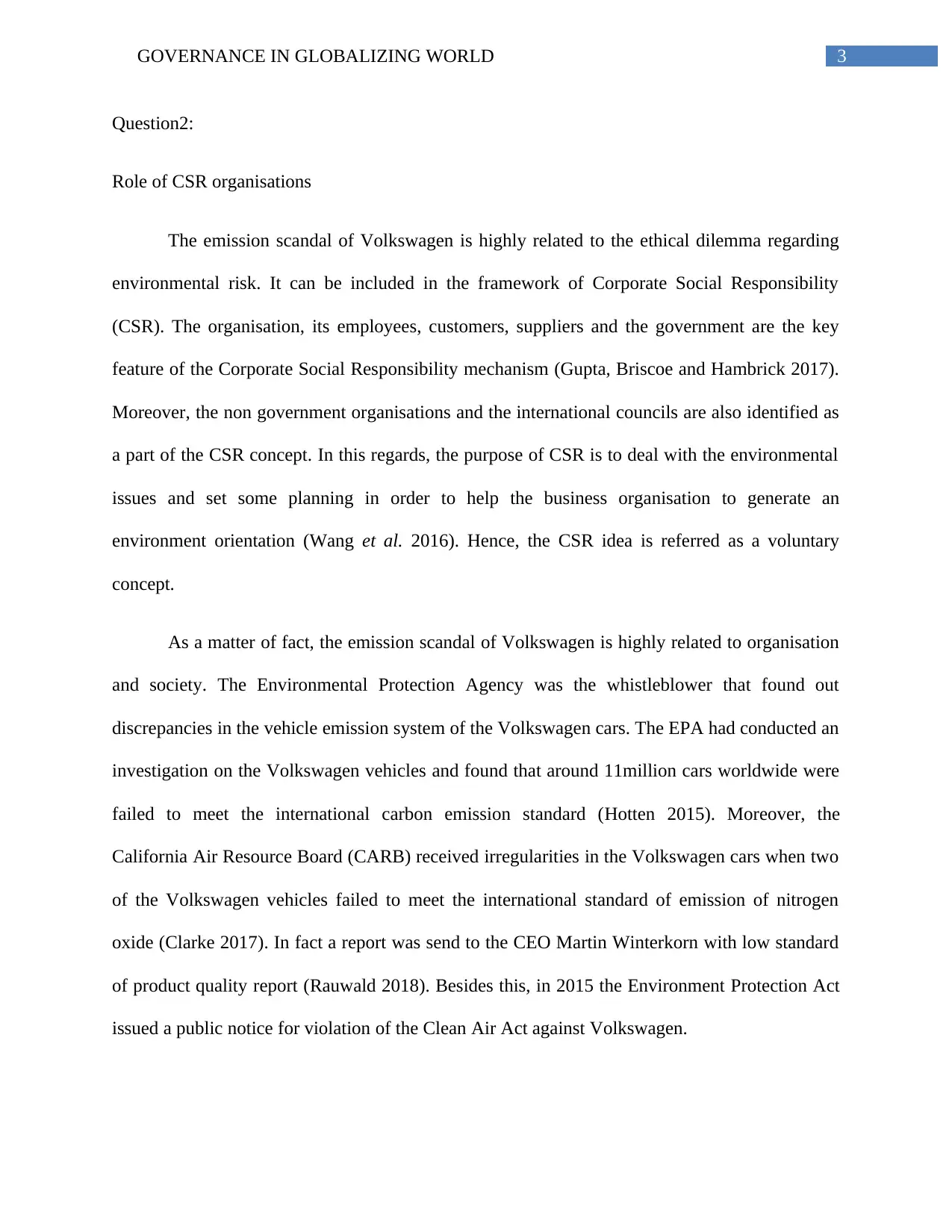
3GOVERNANCE IN GLOBALIZING WORLD
Question2:
Role of CSR organisations
The emission scandal of Volkswagen is highly related to the ethical dilemma regarding
environmental risk. It can be included in the framework of Corporate Social Responsibility
(CSR). The organisation, its employees, customers, suppliers and the government are the key
feature of the Corporate Social Responsibility mechanism (Gupta, Briscoe and Hambrick 2017).
Moreover, the non government organisations and the international councils are also identified as
a part of the CSR concept. In this regards, the purpose of CSR is to deal with the environmental
issues and set some planning in order to help the business organisation to generate an
environment orientation (Wang et al. 2016). Hence, the CSR idea is referred as a voluntary
concept.
As a matter of fact, the emission scandal of Volkswagen is highly related to organisation
and society. The Environmental Protection Agency was the whistleblower that found out
discrepancies in the vehicle emission system of the Volkswagen cars. The EPA had conducted an
investigation on the Volkswagen vehicles and found that around 11million cars worldwide were
failed to meet the international carbon emission standard (Hotten 2015). Moreover, the
California Air Resource Board (CARB) received irregularities in the Volkswagen cars when two
of the Volkswagen vehicles failed to meet the international standard of emission of nitrogen
oxide (Clarke 2017). In fact a report was send to the CEO Martin Winterkorn with low standard
of product quality report (Rauwald 2018). Besides this, in 2015 the Environment Protection Act
issued a public notice for violation of the Clean Air Act against Volkswagen.
Question2:
Role of CSR organisations
The emission scandal of Volkswagen is highly related to the ethical dilemma regarding
environmental risk. It can be included in the framework of Corporate Social Responsibility
(CSR). The organisation, its employees, customers, suppliers and the government are the key
feature of the Corporate Social Responsibility mechanism (Gupta, Briscoe and Hambrick 2017).
Moreover, the non government organisations and the international councils are also identified as
a part of the CSR concept. In this regards, the purpose of CSR is to deal with the environmental
issues and set some planning in order to help the business organisation to generate an
environment orientation (Wang et al. 2016). Hence, the CSR idea is referred as a voluntary
concept.
As a matter of fact, the emission scandal of Volkswagen is highly related to organisation
and society. The Environmental Protection Agency was the whistleblower that found out
discrepancies in the vehicle emission system of the Volkswagen cars. The EPA had conducted an
investigation on the Volkswagen vehicles and found that around 11million cars worldwide were
failed to meet the international carbon emission standard (Hotten 2015). Moreover, the
California Air Resource Board (CARB) received irregularities in the Volkswagen cars when two
of the Volkswagen vehicles failed to meet the international standard of emission of nitrogen
oxide (Clarke 2017). In fact a report was send to the CEO Martin Winterkorn with low standard
of product quality report (Rauwald 2018). Besides this, in 2015 the Environment Protection Act
issued a public notice for violation of the Clean Air Act against Volkswagen.
Secure Best Marks with AI Grader
Need help grading? Try our AI Grader for instant feedback on your assignments.
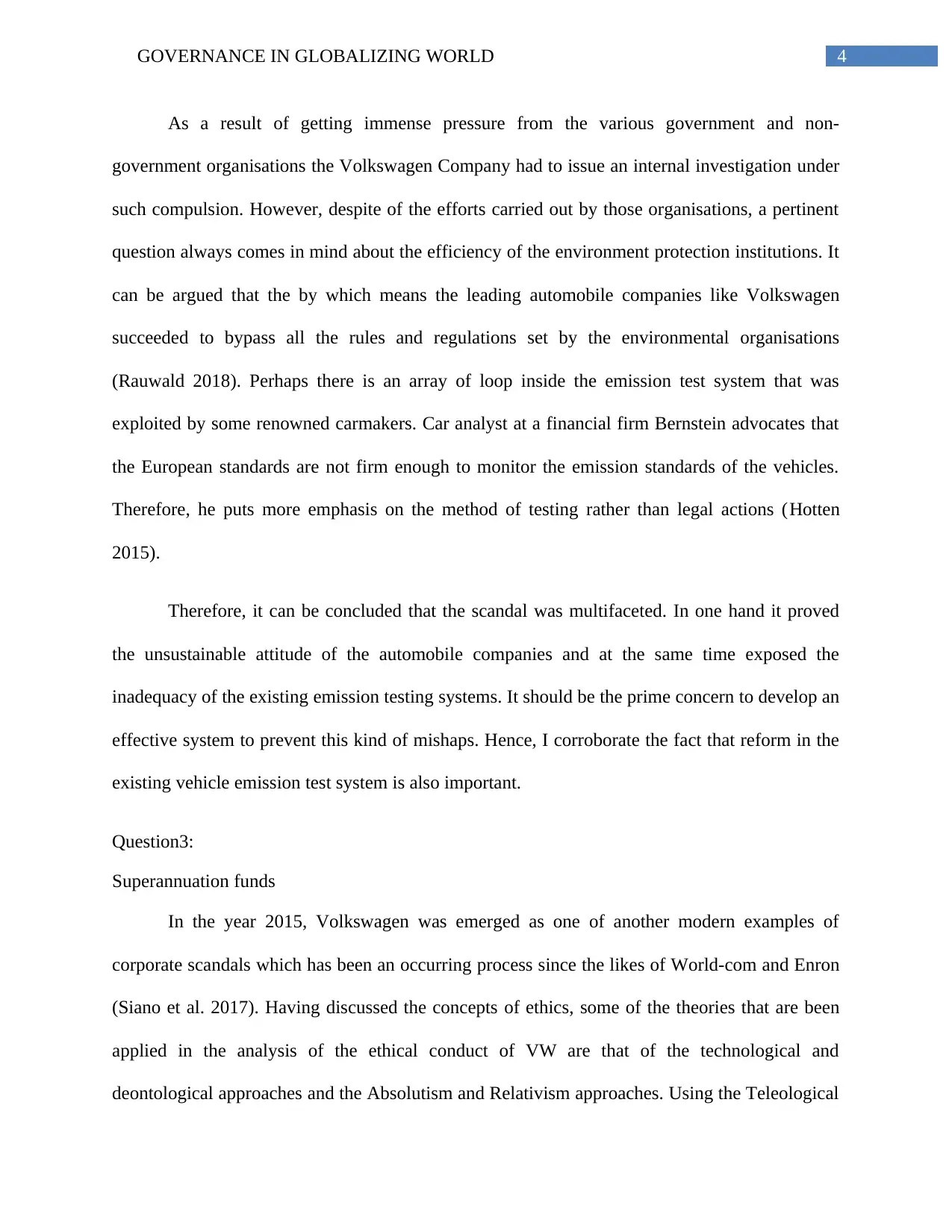
4GOVERNANCE IN GLOBALIZING WORLD
As a result of getting immense pressure from the various government and non-
government organisations the Volkswagen Company had to issue an internal investigation under
such compulsion. However, despite of the efforts carried out by those organisations, a pertinent
question always comes in mind about the efficiency of the environment protection institutions. It
can be argued that the by which means the leading automobile companies like Volkswagen
succeeded to bypass all the rules and regulations set by the environmental organisations
(Rauwald 2018). Perhaps there is an array of loop inside the emission test system that was
exploited by some renowned carmakers. Car analyst at a financial firm Bernstein advocates that
the European standards are not firm enough to monitor the emission standards of the vehicles.
Therefore, he puts more emphasis on the method of testing rather than legal actions (Hotten
2015).
Therefore, it can be concluded that the scandal was multifaceted. In one hand it proved
the unsustainable attitude of the automobile companies and at the same time exposed the
inadequacy of the existing emission testing systems. It should be the prime concern to develop an
effective system to prevent this kind of mishaps. Hence, I corroborate the fact that reform in the
existing vehicle emission test system is also important.
Question3:
Superannuation funds
In the year 2015, Volkswagen was emerged as one of another modern examples of
corporate scandals which has been an occurring process since the likes of World-com and Enron
(Siano et al. 2017). Having discussed the concepts of ethics, some of the theories that are been
applied in the analysis of the ethical conduct of VW are that of the technological and
deontological approaches and the Absolutism and Relativism approaches. Using the Teleological
As a result of getting immense pressure from the various government and non-
government organisations the Volkswagen Company had to issue an internal investigation under
such compulsion. However, despite of the efforts carried out by those organisations, a pertinent
question always comes in mind about the efficiency of the environment protection institutions. It
can be argued that the by which means the leading automobile companies like Volkswagen
succeeded to bypass all the rules and regulations set by the environmental organisations
(Rauwald 2018). Perhaps there is an array of loop inside the emission test system that was
exploited by some renowned carmakers. Car analyst at a financial firm Bernstein advocates that
the European standards are not firm enough to monitor the emission standards of the vehicles.
Therefore, he puts more emphasis on the method of testing rather than legal actions (Hotten
2015).
Therefore, it can be concluded that the scandal was multifaceted. In one hand it proved
the unsustainable attitude of the automobile companies and at the same time exposed the
inadequacy of the existing emission testing systems. It should be the prime concern to develop an
effective system to prevent this kind of mishaps. Hence, I corroborate the fact that reform in the
existing vehicle emission test system is also important.
Question3:
Superannuation funds
In the year 2015, Volkswagen was emerged as one of another modern examples of
corporate scandals which has been an occurring process since the likes of World-com and Enron
(Siano et al. 2017). Having discussed the concepts of ethics, some of the theories that are been
applied in the analysis of the ethical conduct of VW are that of the technological and
deontological approaches and the Absolutism and Relativism approaches. Using the Teleological
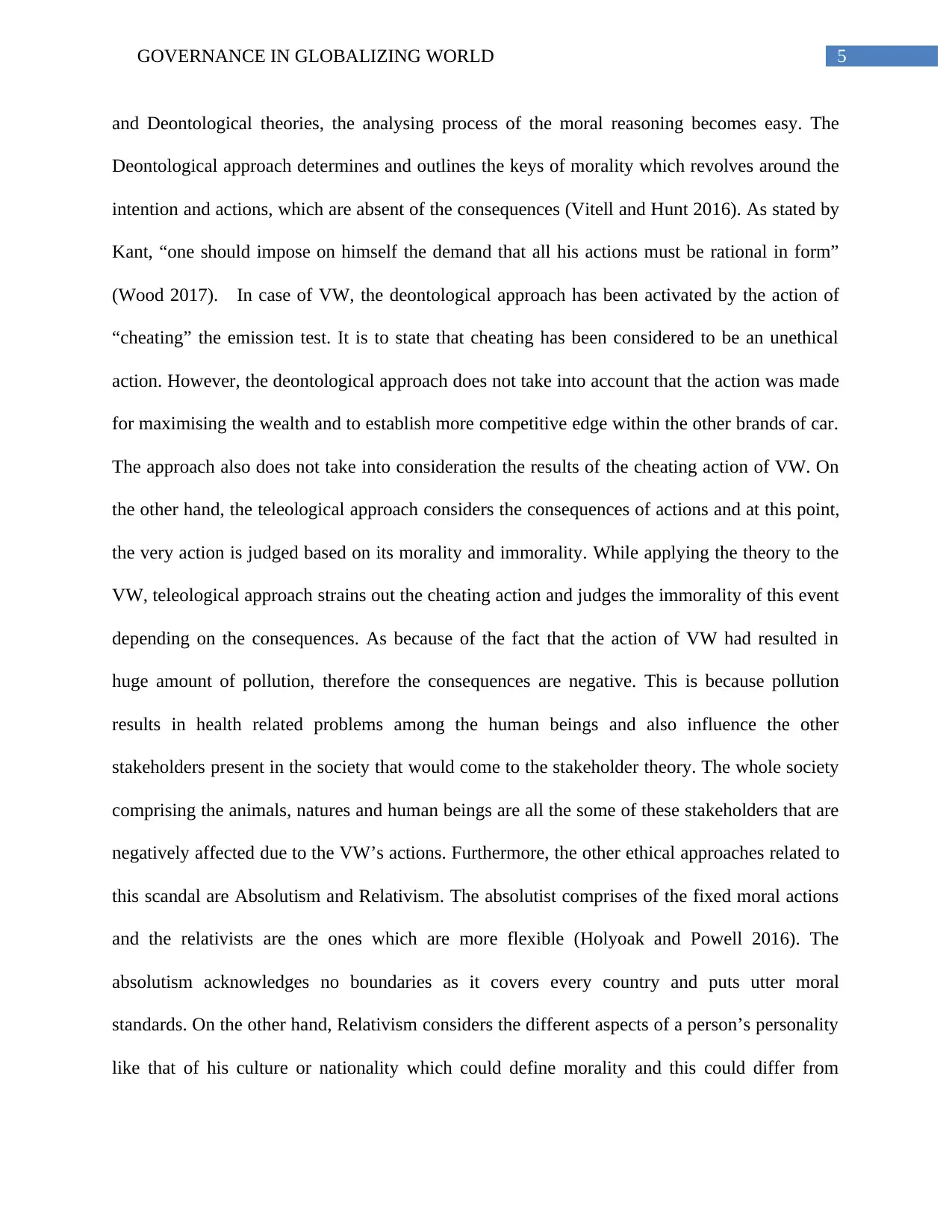
5GOVERNANCE IN GLOBALIZING WORLD
and Deontological theories, the analysing process of the moral reasoning becomes easy. The
Deontological approach determines and outlines the keys of morality which revolves around the
intention and actions, which are absent of the consequences (Vitell and Hunt 2016). As stated by
Kant, “one should impose on himself the demand that all his actions must be rational in form”
(Wood 2017). In case of VW, the deontological approach has been activated by the action of
“cheating” the emission test. It is to state that cheating has been considered to be an unethical
action. However, the deontological approach does not take into account that the action was made
for maximising the wealth and to establish more competitive edge within the other brands of car.
The approach also does not take into consideration the results of the cheating action of VW. On
the other hand, the teleological approach considers the consequences of actions and at this point,
the very action is judged based on its morality and immorality. While applying the theory to the
VW, teleological approach strains out the cheating action and judges the immorality of this event
depending on the consequences. As because of the fact that the action of VW had resulted in
huge amount of pollution, therefore the consequences are negative. This is because pollution
results in health related problems among the human beings and also influence the other
stakeholders present in the society that would come to the stakeholder theory. The whole society
comprising the animals, natures and human beings are all the some of these stakeholders that are
negatively affected due to the VW’s actions. Furthermore, the other ethical approaches related to
this scandal are Absolutism and Relativism. The absolutist comprises of the fixed moral actions
and the relativists are the ones which are more flexible (Holyoak and Powell 2016). The
absolutism acknowledges no boundaries as it covers every country and puts utter moral
standards. On the other hand, Relativism considers the different aspects of a person’s personality
like that of his culture or nationality which could define morality and this could differ from
and Deontological theories, the analysing process of the moral reasoning becomes easy. The
Deontological approach determines and outlines the keys of morality which revolves around the
intention and actions, which are absent of the consequences (Vitell and Hunt 2016). As stated by
Kant, “one should impose on himself the demand that all his actions must be rational in form”
(Wood 2017). In case of VW, the deontological approach has been activated by the action of
“cheating” the emission test. It is to state that cheating has been considered to be an unethical
action. However, the deontological approach does not take into account that the action was made
for maximising the wealth and to establish more competitive edge within the other brands of car.
The approach also does not take into consideration the results of the cheating action of VW. On
the other hand, the teleological approach considers the consequences of actions and at this point,
the very action is judged based on its morality and immorality. While applying the theory to the
VW, teleological approach strains out the cheating action and judges the immorality of this event
depending on the consequences. As because of the fact that the action of VW had resulted in
huge amount of pollution, therefore the consequences are negative. This is because pollution
results in health related problems among the human beings and also influence the other
stakeholders present in the society that would come to the stakeholder theory. The whole society
comprising the animals, natures and human beings are all the some of these stakeholders that are
negatively affected due to the VW’s actions. Furthermore, the other ethical approaches related to
this scandal are Absolutism and Relativism. The absolutist comprises of the fixed moral actions
and the relativists are the ones which are more flexible (Holyoak and Powell 2016). The
absolutism acknowledges no boundaries as it covers every country and puts utter moral
standards. On the other hand, Relativism considers the different aspects of a person’s personality
like that of his culture or nationality which could define morality and this could differ from
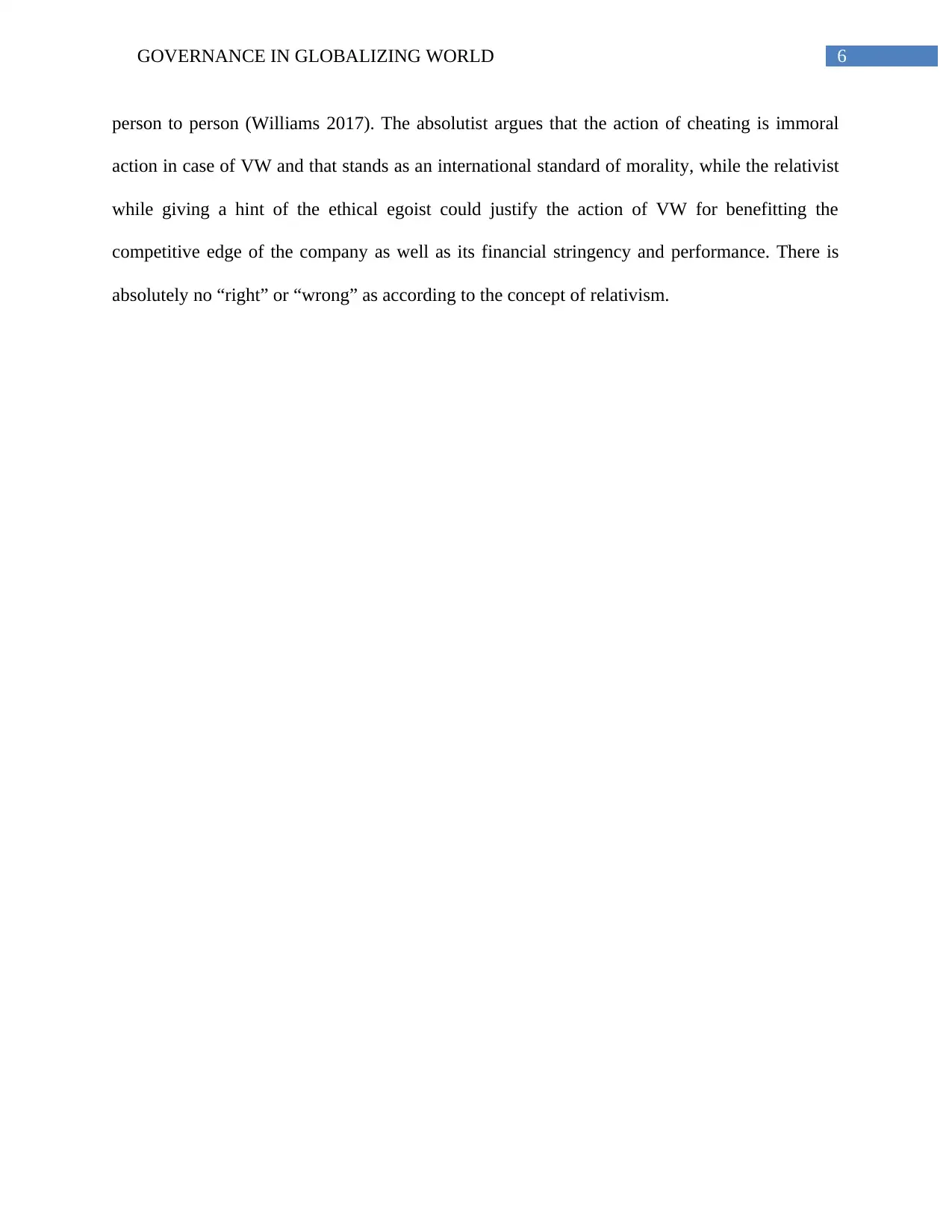
6GOVERNANCE IN GLOBALIZING WORLD
person to person (Williams 2017). The absolutist argues that the action of cheating is immoral
action in case of VW and that stands as an international standard of morality, while the relativist
while giving a hint of the ethical egoist could justify the action of VW for benefitting the
competitive edge of the company as well as its financial stringency and performance. There is
absolutely no “right” or “wrong” as according to the concept of relativism.
person to person (Williams 2017). The absolutist argues that the action of cheating is immoral
action in case of VW and that stands as an international standard of morality, while the relativist
while giving a hint of the ethical egoist could justify the action of VW for benefitting the
competitive edge of the company as well as its financial stringency and performance. There is
absolutely no “right” or “wrong” as according to the concept of relativism.
Paraphrase This Document
Need a fresh take? Get an instant paraphrase of this document with our AI Paraphraser
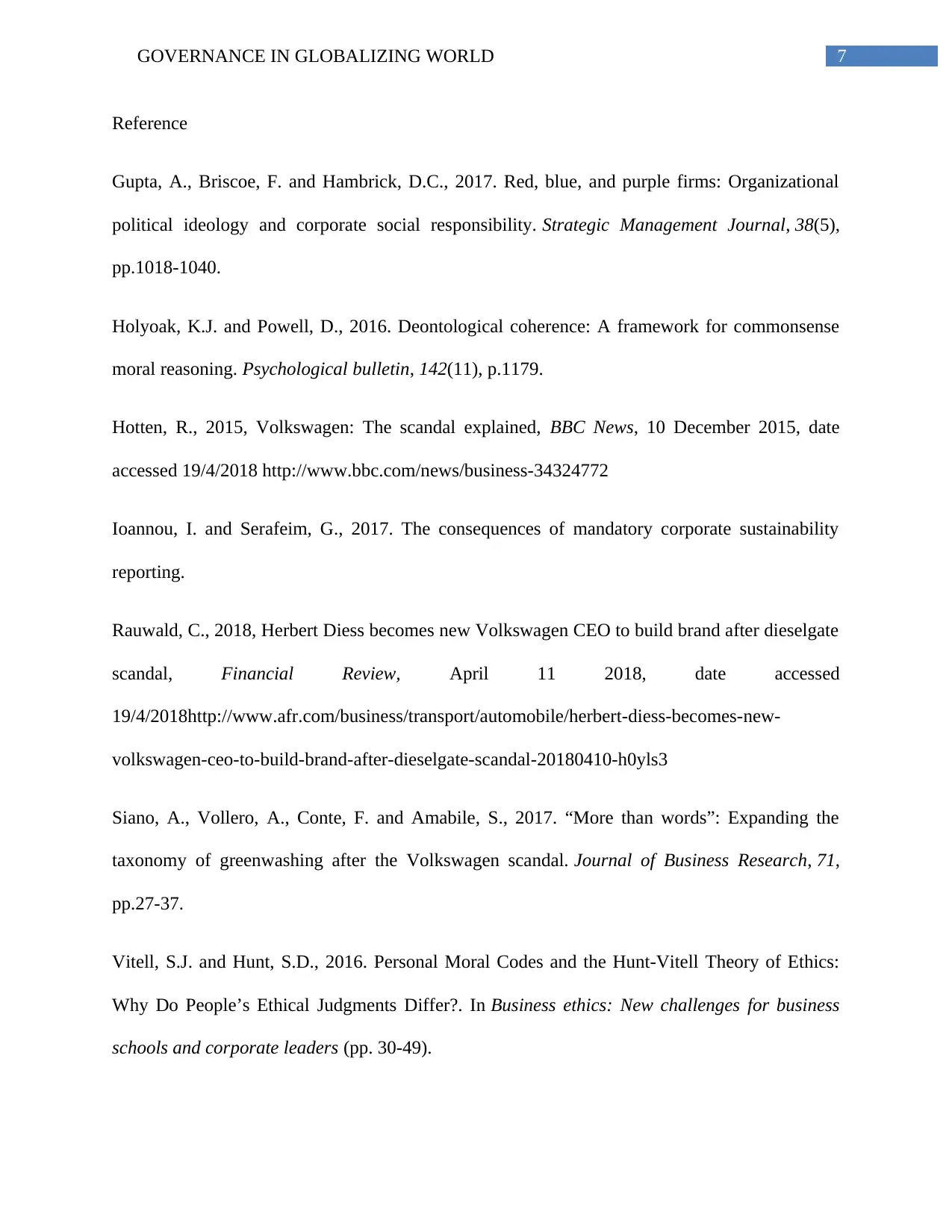
7GOVERNANCE IN GLOBALIZING WORLD
Reference
Gupta, A., Briscoe, F. and Hambrick, D.C., 2017. Red, blue, and purple firms: Organizational
political ideology and corporate social responsibility. Strategic Management Journal, 38(5),
pp.1018-1040.
Holyoak, K.J. and Powell, D., 2016. Deontological coherence: A framework for commonsense
moral reasoning. Psychological bulletin, 142(11), p.1179.
Hotten, R., 2015, Volkswagen: The scandal explained, BBC News, 10 December 2015, date
accessed 19/4/2018 http://www.bbc.com/news/business-34324772
Ioannou, I. and Serafeim, G., 2017. The consequences of mandatory corporate sustainability
reporting.
Rauwald, C., 2018, Herbert Diess becomes new Volkswagen CEO to build brand after dieselgate
scandal, Financial Review, April 11 2018, date accessed
19/4/2018http://www.afr.com/business/transport/automobile/herbert-diess-becomes-new-
volkswagen-ceo-to-build-brand-after-dieselgate-scandal-20180410-h0yls3
Siano, A., Vollero, A., Conte, F. and Amabile, S., 2017. “More than words”: Expanding the
taxonomy of greenwashing after the Volkswagen scandal. Journal of Business Research, 71,
pp.27-37.
Vitell, S.J. and Hunt, S.D., 2016. Personal Moral Codes and the Hunt-Vitell Theory of Ethics:
Why Do People’s Ethical Judgments Differ?. In Business ethics: New challenges for business
schools and corporate leaders (pp. 30-49).
Reference
Gupta, A., Briscoe, F. and Hambrick, D.C., 2017. Red, blue, and purple firms: Organizational
political ideology and corporate social responsibility. Strategic Management Journal, 38(5),
pp.1018-1040.
Holyoak, K.J. and Powell, D., 2016. Deontological coherence: A framework for commonsense
moral reasoning. Psychological bulletin, 142(11), p.1179.
Hotten, R., 2015, Volkswagen: The scandal explained, BBC News, 10 December 2015, date
accessed 19/4/2018 http://www.bbc.com/news/business-34324772
Ioannou, I. and Serafeim, G., 2017. The consequences of mandatory corporate sustainability
reporting.
Rauwald, C., 2018, Herbert Diess becomes new Volkswagen CEO to build brand after dieselgate
scandal, Financial Review, April 11 2018, date accessed
19/4/2018http://www.afr.com/business/transport/automobile/herbert-diess-becomes-new-
volkswagen-ceo-to-build-brand-after-dieselgate-scandal-20180410-h0yls3
Siano, A., Vollero, A., Conte, F. and Amabile, S., 2017. “More than words”: Expanding the
taxonomy of greenwashing after the Volkswagen scandal. Journal of Business Research, 71,
pp.27-37.
Vitell, S.J. and Hunt, S.D., 2016. Personal Moral Codes and the Hunt-Vitell Theory of Ethics:
Why Do People’s Ethical Judgments Differ?. In Business ethics: New challenges for business
schools and corporate leaders (pp. 30-49).
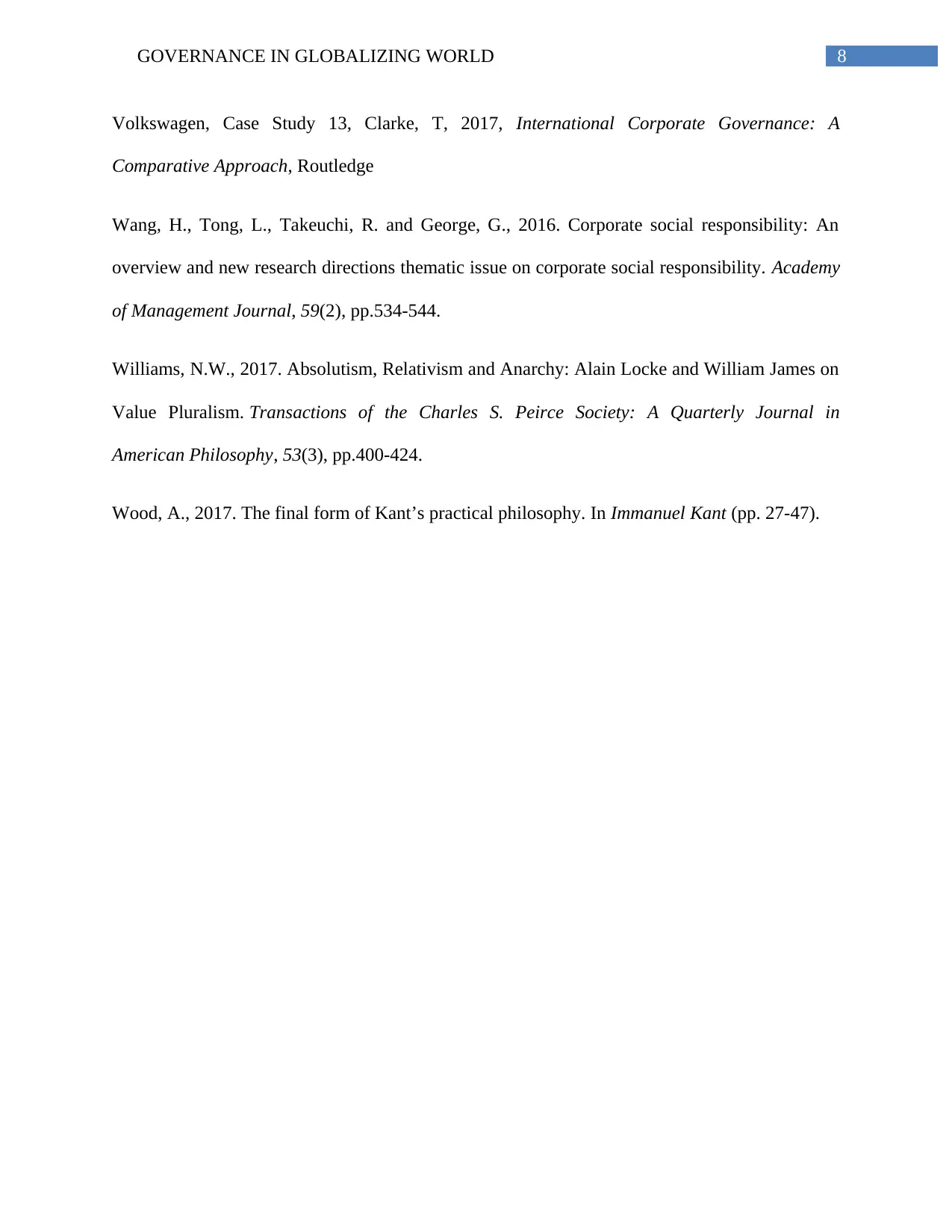
8GOVERNANCE IN GLOBALIZING WORLD
Volkswagen, Case Study 13, Clarke, T, 2017, International Corporate Governance: A
Comparative Approach, Routledge
Wang, H., Tong, L., Takeuchi, R. and George, G., 2016. Corporate social responsibility: An
overview and new research directions thematic issue on corporate social responsibility. Academy
of Management Journal, 59(2), pp.534-544.
Williams, N.W., 2017. Absolutism, Relativism and Anarchy: Alain Locke and William James on
Value Pluralism. Transactions of the Charles S. Peirce Society: A Quarterly Journal in
American Philosophy, 53(3), pp.400-424.
Wood, A., 2017. The final form of Kant’s practical philosophy. In Immanuel Kant (pp. 27-47).
Volkswagen, Case Study 13, Clarke, T, 2017, International Corporate Governance: A
Comparative Approach, Routledge
Wang, H., Tong, L., Takeuchi, R. and George, G., 2016. Corporate social responsibility: An
overview and new research directions thematic issue on corporate social responsibility. Academy
of Management Journal, 59(2), pp.534-544.
Williams, N.W., 2017. Absolutism, Relativism and Anarchy: Alain Locke and William James on
Value Pluralism. Transactions of the Charles S. Peirce Society: A Quarterly Journal in
American Philosophy, 53(3), pp.400-424.
Wood, A., 2017. The final form of Kant’s practical philosophy. In Immanuel Kant (pp. 27-47).
1 out of 9
Related Documents
Your All-in-One AI-Powered Toolkit for Academic Success.
+13062052269
info@desklib.com
Available 24*7 on WhatsApp / Email
![[object Object]](/_next/static/media/star-bottom.7253800d.svg)
Unlock your academic potential
© 2024 | Zucol Services PVT LTD | All rights reserved.





